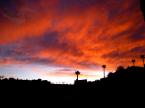"BUT souls that of his own good life partake,
He loves as his own self; dear as his eye
He loves as his own self; dear as his eye
When they shall die, then God himself shall die:
They live, they live in blest eternity."Henry More.
But two cannot go abreast,
Cannot travel in it two:
Yonder masterful cuckoo
Crowds every egg out of the nest,
Quick or dead, except its own;
A spell is laid on sod and stone,
Night and Day 've been tampered with,
Every quality and pith
Surcharged and sultry with a power
That works its will on age and hour
THERE is a difference between one and another hour of life in their authority and subsequent effect. Our faith
comes in moments; our vice is habitual. Yet there is a depth in those brief moments which constrains us to
ascribe more reality to them than to all other experiences.
For this reason the argument which is always forthcoming to silence those who conceive extraordinary hopes of man, namely the appeal to experience, is for ever invalid andvain.
We give up the past to the objector, and yet we hope. He must explain this hope. We grant that human life is mean, but how did we find out that it was mean? What is the ground of this uneasiness of ours; of this old discontent?
What is the universal sense of want and ignorance, but the fine innuendo by which the soul makes its enormous claim? Whydo men feel that the natural history of man has never been written, but he is always leaving behind what you have said of him, and it becomes old, and books of metaphysics worthless?
The philosophy of six thousand years has not searched the chambers and magazines of the soul. In its
experiments there has always remained, in the last analysiss a residuum it could not resolve. Man is a stream whose source is hidden. Our being is descending into us from we know not whence.






















